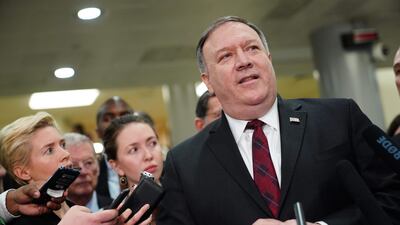US Secretary of State Mike Pompeo will address a United Nations Security Council meeting on Wednesday where members will hear Iran is sticking by its nuclear deal with world powers, but pursuing ballistic missile tests that are coming under increased scrutiny and criticism.
The sixth report of the UN Secretary-General in to the 2015 agreement known as the Joint Comprehensive Plan of Action, which lifted sanctions on Iran in return for it curtailing its atomic activities, says the agreement must continue despite the US’s unilateral withdrawal in May.
It also outlines objections to the US decision, saying the accord “is fundamental to regional and international peace and security”, and hints that Iran’s missile tests should be addressed separately by UN members.
_______________
Read more:
Britain accuses Iran of flouting UN resolution with new missile test
Iran's Rouhani warns West will be flooded with drugs after US sanctions
_______________
Iran has stuck by the deal despite “considerable challenges brought about by the withdrawal of the United States of America” and “its subsequent decisions to reimpose all its national sanctions that had been lifted or waived” when the deal was fully implemented in January 2016, the report, released late on Tuesday, said.
That assessment is likely to infuriate Mr Pompeo who has railed against Iran since becoming US President Donald Trump’s secretary of state in April, following the sacking of Rex Tillerson, and overseeing the reimposition of sanctions on Tehran.
Most recently, Mr Pompeo hit out at Iran over a December 1 test of a missile he said was capable of “carrying multiple warheads”, insisting it was a violation of UN Security Council resolution 2231, which accompanied the nuclear deal struck after negotiations between president Barack Obama’s administration. Iran on Tuesday belatedly confirmed the missile test had taken place.
Britain, China, France, Russia and Germany, the other major countries in the negotiations, stand by the deal and have vowed to continue legitimate trade with Iran despite the US pulling out.
The State Department confirmed he would travel to the UN headquarters in New York to attend the Security Council meeting, where Iran’s recent ballistic missile activity will be discussed.
Resolution 2231 requires Iran “not to undertake any activity related to ballistic missiles designed to be capable of delivering nuclear weapons, including launches using such ballistic missile technology” until 2024 at the earliest.
The diplomatic language has since been contested because the wording does not explicitly forbid missile activity, effectively opening a loophole for test firing to continue should Tehran, which insists its missile programme is for defensive purposes only, so wish.
The December 1 launch prompted an emergency meeting of the Security Council last week, with Britain and Germany calling for a debate on whether Iran was abiding by resolution 2231.
British Ambassador to the UN Karen Pierce said the missile test went “way beyond legitimate defensive needs” and that “there is no legitimate reason why Iran should flout the resolution”.
Wednesday’s UN report also addresses the remains of three missiles that were fired towards Saudi Arabia on March 25 and April 11 of this year by Houthi rebels in Yemen, which the kingdom has blamed on Iran.
Although the missiles had design features consistent with Iranian Qiam-1 short-range ballistic missiles the UN “has not been able to determine whether such missiles, parts thereof or related technology were transferred from the Islamic Republic of Iran after January 2016” when the nuclear deal and resolution 2231 came into effect, the report says.
The UN does however say that two container launch units for anti-tank guided missiles recovered by the Saudi-led coalition in Yemen had “characteristics of Iranian manufacture”, as did a partly disassembled surface-to-air missile, and drones seized in Yemen. A further report on all such armaments is to follow at a later date, the UN said.
Wednesday’s report says an arms shipment which the US invited the UN to inspect in October, consisting of 2,500 assault rifles seized on August 28 en route to Yemen in international waters in the Gulf of Aden “did not have the characteristics of Iranian production”.

